On the Clock
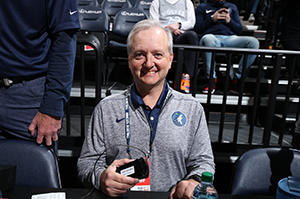
DAVID SHERMAN/NBA PHOTOS
Bank vice president by day, Brian Kuiper is courtside at the Target Center many evenings, running the shot clock for the Minnesota Timberwolves and Lynx.
Brian Kuiper ’85 knows the pressure of the big game—how one split second can change everything.
Though he’s never played or coached a minute of professional basketball, Kuiper has become a fixture on the sidelines of Minnesota Timberwolves and Minnesota Lynx games. He is the teams’ shot clock operator.
“The pressure is concentration,” he says. “Most of the time I could not tell you what the score of the game is—if we’re up 10 or down 10.”
It’s a far cry from Kuiper’s day job as a bank vice president in St. Peter, about an hour southwest of Minneapolis. His journey to the Target Center began when he started operating the clock for the local college’s games.
Then in 2006, he got a call: The Lynx were inviting him to try out as their shot-clock operator.
“I kind of thought it was a joke,” he says. It wasn’t.
Soon he was part of the Lynx’s rotation of shot-clock operators. Seven years ago, he started working T-Wolves games, too.
No matter the game, Kuiper says his goal is always the same: “I’ve never wanted anybody to know when I was there. Because if they do, it means I messed up.”
BY JARED KALTWASSER
Community Builder
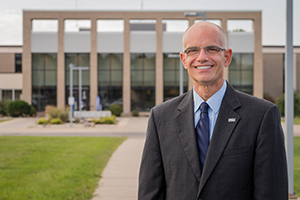
SUBMITTED PHOTO
A longtime college professor and administrator, Terry Gaalswyk has been president of Minnesota West Community & Technical College since 2015.
The neighborhood is cleaner. Homeowners take care of their properties.
As the carpentry department of Minnesota West Community & Technical College wrapped up its third house renovation for local families, Dr. Terry Gaalswyk ’91 says the transformation perfectly summarizes his vision for this five-campus institution, which he has served as president since 2015.
“Leveraging gifts and talents in service to our communities is our calling and purpose,” says Gaalswyk. “Career and technical education builds strong individuals and strong communities.”
The idea of using one’s skills to contribute locally is highly personal for the college president. From his middle school years until his late 30s, Gaalswyk spent weeknights and Saturdays working for his father’s wholesale cabinet business in Sibley, Iowa. Applying mathematical theory to carpentry turned a lightbulb on for Gaalswyk, leading him out of his hometown neighborhood and in the direction of career and technical education.
A former mathematics lecturer at both two- and four-year institutions, Gaalswyk served as executive vice president of Western Nebraska Community College as well as dean of instruction at Western Iowa Tech Community College before assuming the presidency at Minnesota West.
Gaalswyk offered to help hang cabinets with this year’s students at the renovation, but—he says with a laugh—they haven’t yet taken him up on his proposal.
BY AMY PHILLIPS
Word Weaver
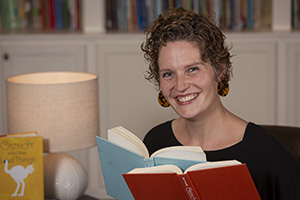
AARON HAUTALA
Beth Hautala’s second tween novel, The Ostrich and Other Lost Things, won a Christopher Award for affirming the highest values of the human spirit.
Author Beth (Holznagel ’01) Hautala weaves stories from everyday life when she can find a minute in her own to do so. She thrives on threading together “the mundane and the miraculous,” whether writing a novel, telling her four children a bedtime story, or serving a client at Strateligent, the marketing firm in Brainerd, Minnesota, that she and her husband, Aaron, founded together.
Currently writing her third tween novel, Hautala is passionate about stories of redemption. Without avoiding the “holes” human pain creates, she invites readers to see themselves and their pain alongside the reality of hope—“a tiny thread tied to the heart of Christ.”
Hautala’s debut novel, Waiting for Unicorns, was written in 2015 shortly after the birth of her second child, during her own search for identity in the midst of the ordinary. Last May Hautala received a prestigious Christopher Award for her second book, The Ostrich and Other Lost Things, a middle-grade chapter book exploring the challenges and self-discovery that accompany caring for a sibling with autism.
“I suppose I’ll always be telling stories littered with these kinds of holes, and tied to this kind of hope, because it’s also what makes me whole,” Hautala says.
BY BETH (NIKKEL ’02) GAULKE
Genetic Counselor
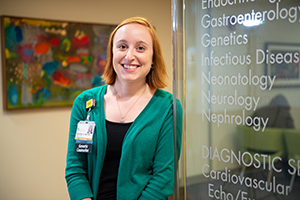
SUSAN MCCLELLEN
Anna Paulson works with families as a genetic counselor at the University of Iowa Hospitals.
As a freshman at Northwestern College, Anna (Yarrow ’12) Paulson was passionate about three things: children, science and people with special needs.
Her only question: What career could encompass all three?
She majored in biology-health professions with thoughts of becoming a physical therapist or physician. Soon she found a better answer: genetic counseling.
In 2017, after earning her master’s degree in that field from Virginia Commonwealth University, Paulson accepted a job at the University of Iowa Hospitals. There she works with families of children with suspected genetic disorders, helping translate the complicated science of genetics into comprehensible insights for parents who are desperate for answers.
“We have a rapport,” she says. “We’re the first point of contact. They don’t necessarily call the doctors; they call us.”
Paulson says confirmation that a disease is genetic can be transformational for parents.
“It relieves a little bit of the guilt,” she says, noting that many parents worry the disease was a result of something they could have prevented.
Unfortunately, genetic testing detects a clear diagnosis only about one-third of the time. But Paulson is confident the fast-changing science will improve that statistic.
“At some point we are going to find an answer for everybody,” she says.
BY JARED KALTWASSER
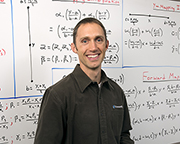 Meet 10 alumni who are leading lives of significance. As they heal bodies and minds, spread the gospel and empathy, and fight human trafficking and pornography, they stand out.
Meet 10 alumni who are leading lives of significance. As they heal bodies and minds, spread the gospel and empathy, and fight human trafficking and pornography, they stand out.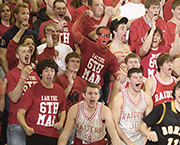 For 25 years, Northwestern athletes have been making Raider Magic in the Bultman Center. Here are some of the most memorable moments.
For 25 years, Northwestern athletes have been making Raider Magic in the Bultman Center. Here are some of the most memorable moments. High school psychology teacher Ali Ter Horst won $25,000 for inspiring students through innovative instruction, high expectations and vulnerability.
High school psychology teacher Ali Ter Horst won $25,000 for inspiring students through innovative instruction, high expectations and vulnerability.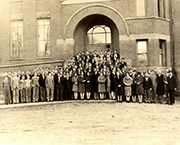 When Reformed Church leaders suggested in 1932 that Northwestern Junior College close temporarily, the Board of Trustees responded with an emphatic no.
When Reformed Church leaders suggested in 1932 that Northwestern Junior College close temporarily, the Board of Trustees responded with an emphatic no.
Classic Comments
All comments are moderated and need approval from the moderator before they are posted. Comments that include profanity, or personal attacks, or antisocial behavior such as "spamming" or other inappropriate comments or material will be removed from the site. We will take steps to block users who violate any of our terms of use. You are fully responsible for the content that you post. Comments posted do not reflect the views or values of Northwestern College.